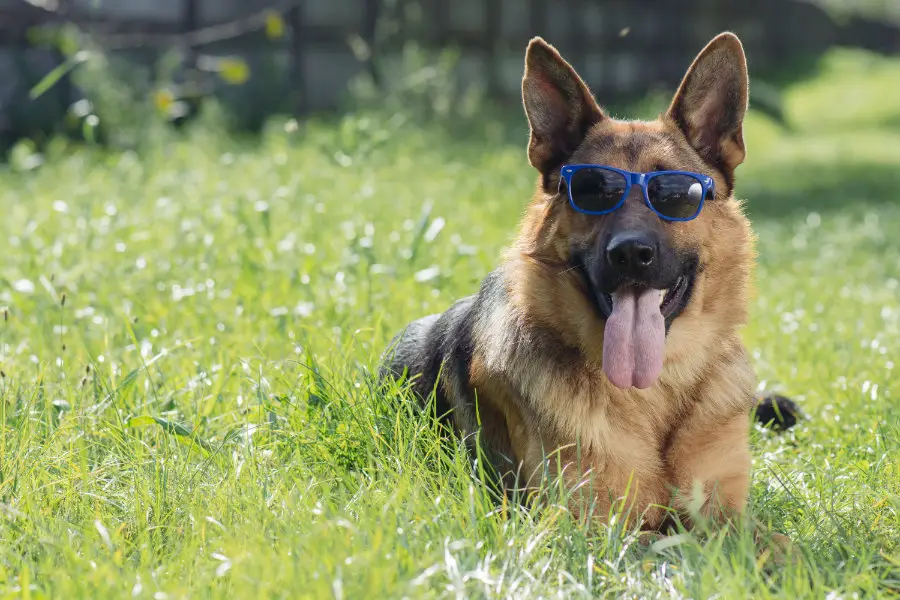One of the most important considerations before getting a German Shepherd Dog would be the lifespan of the breed.
The average life expectancy of a German Shepherd Dog is between 7 to 10 years. These dogs are among the most intelligent and loving creatures out there, and it’s easy to get attached to them dearly. But unfortunately, they may not live as long as some other popular breeds.
This article discusses the factors affecting a German Shepherd’s lifespan and tips on how you can help your dog live a long and healthy life.
Average Lifespan Of A German Shepherd

According to the American Kennel Club, the average life expectancy of a German Shepherd depends on several factors like health conditions and genetics. Female German Shepherds generally live longer than their male counterparts.
But do remember that with proper diet and exercise, your dog can easily live for more than a decade.
Some studies have been performed and in general, if you take utmost care of your pet, a German Shepherd may live up to 13 years, and some times more.
Factors That Affect The Lifespan Of A German Shepherd
These are the things that influence how long a dog lives:
Diseases
A German Shepherd is considered one of the healthiest dog breeds with comparatively fewer health risks.
However, it isn’t immune to everything and can catch several diseases, including hip and elbow dysplasia, gastric dilation-volvulus (GDV), epilepsy, hemophilia, diabetes, pancreatitis, degenerative disc disease, panosteitis, etc.
An ill dog won’t be able to eat or exercise well, which may dramatically decrease its lifespan.
Exercise

Since a German Shepherd is a highly athletic dog, it needs adequate exercise to reach its maximum age. Not working out enough will affect its physical and mental well-being, shortening its life.
Nutrition
When it comes to food, your dog should get must get the necessary of nutrition, no more and no less.
Not getting enough minerals or vitamins can make a dog malnourished, causing it to develop health issues such as joint problems and affecting its immunity levels.
On the other hand, overfeeding your dog can make it obese and exercise less.
Veterinary and General Care
Even a seemingly healthy dog needs regular screenings to ensure it’s in good condition physically and mentally. Furthermore, even small problems such as the common cold or flea infestation can sometimes culminate into something serious if left untreated for a long time.
In addition to good healthcare, cleanliness and proper grooming are essential to keep a dog healthy. Infections from foreign objects such as dirt or germs sticking to its body can affect its lifespan.
Mental Stimulation
It may come as a surprise to many, but dogs can also get depressed. Even if the effects aren’t as apparent as in humans, over time, stress can cause dogs to lose interest in daily activities like eating or running, negatively impacting their well-being.
Remember, especially active and loving dogs such as German Shepherds are more prone to depression. They will become sad if their activity levels are lower than needed or if they are made to stay apart from their owners for a long time.
Other Environmental Factors
Research shows that dogs living in polluted areas are more prone to conditions such as brain inflammation. In addition, another study shows that pets that live with a smoker may have more risks of respiratory illnesses, eye problems, allergies, etc.
Dogs like sniffing things. This also means that if the floor or the area where they live is dirty, germs may enter their respiratory system, causing all sorts of health problems.
All in all, we can say that German Shepherds live longer in pollution-free and clean places with less harmful irritants.
How To Increase The Lifespan Of My German Shepherd?
The key to making sure that your dog lives long lies in addressing everything that causes it to be physically or mentally unhealthy. Here are the things you can do for that:
Feed The Right Amount Of Food
German Shepherd puppies between 2 and 10 months of age should be given 4 to 16 oz of food per day, spread out between 3 meals.
On the other hand, German Shepherds between 10 and 12 months should get about 24 oz of food every day spread out between 2 meals.

As per the National Research Council, adult German Shepherds should get between 1270 to 2100 calories per day, depending on their activity levels and age. Older and less active dogs need fewer calories.
On average, we can say an adult requires about 35 calories per pound, and a puppy needs about 70 calories per pound.
Maintain A Healthy Weight
The ideal weight of male German Shepherd dogs is between 65 and 90 pounds. On the other hand, a female should weigh between 50 and 70 pounds.
The most important thing to consider to maintain a healthy weight is the calories. But you also have to ensure that your pet gets a balanced meal with all the required nutrition.
Give Them A Balanced Diet
You should prioritize high-quality pet food rather than human food. At least 25% of active dogs’ daily calories should come from protein.
Ensure that the pet food you buy has a healthy mix of animals and plant-based protein since German Shepherds are not known to have the strongest stomachs.
You should also maintain fat levels of 10% to 15% and fiber around 5%.
Finally, buy food without any added sugar since your dog doesn’t need those extra calories. Sugar can also cause dental issues.
Routine Health Checkups and Activities
Your puppy should get all the core vaccines (DHLPP) and shots for rabies, distemper, hepatitis, and parvovirus.
In addition, you should take your dog at least twice a year to the vet for regular screenings. Of course, your vet may recommend more or fewer visits depending on the mutt’s condition.
Take good care of its cleanliness and general well-being. Keep it away from the dirt, bathe it regularly, and do everything else that you do to follow your own hygiene.
Give Them Adequate Exercise
A German Shepherd needs at least 2 hours of exercise every day.
This can be a mix of walking, running, or playing, and experts recommend these 2 hours to be spread across the day rather than doing it all at once.
Finally, if you haven’t gotten a German Shepherd yet, kindly rethink your decision if you’re not sure if you can be that much active. After all, there are other dog breeds that won’t need as much exercise but will love you equally.
Conclusion
A German Shepherd can easily live more than 10 years if you take good care of it.
This includes giving it the right amount and type of food and looking out for any diseases it may have. Furthermore, take it out for regular walks, provide physical and mental exercises, and don’t forget to be wary about its hygiene.
